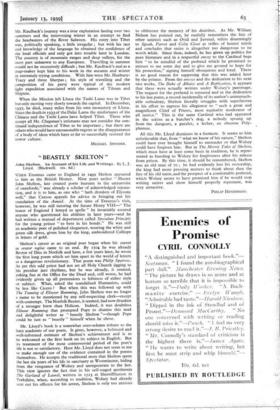" BEASTLY SKELTON "
John Skelton. An Account of his Life and Writings. By L. J. Lloyd. (Blackwell. iros. 6d.)
WHEN Erasmus came to England in 1499 Skelton appeared to him as the British Homer. Nine years earlier " Master John Skelton, late created poete laureate in the unyuersite of oxenforde," was already a scholar of acknowledged reputa- tion, and it is to him, as one who " bath dronken of Elycons well," that Caxton appeals for advice in bringing out his translation of the Aeneid. At the time of Erasmus's visit, however, he was still tutoring the future Henry VIII—" The honor of Englond I lernyd to spelle " he invariably assured anyone, who questioned his abilities in later years—and he had written a manual of deportment called Speculum Principis for the young prince " to bere in his honde." He was still an academic poet of polished eloquence, wearing the white and green silk dress, given him by the king, embroidered Calliope in letters of gold.
Skelton's career as an original poet began when his career as orator regius came to an end. By 1504 he was already Rector of Diss in Norfolk and here, a few years later, he wrote the first long poem which set him apart in the world of letters as a dangerous revolutionary. That poem was Philip Sparrow. As yet this odd priest had not set all Holy Church jigging to his peculiar jazz rhythms, but he was already, it seemed, poking fun at the Office for the Dead and, still worse, he had evidently given up all pretensions to loftiness of either style or subject. What, asked the scandalised Humanists, could be less like Cicero ? But when this was followed up with The Tunning of Elinour Rumming, John Skelton was no longer a name to be mentioned by any self-respecting clerk—except with contempt. The Norfolk Rector, it seemed, had now drunken of a stronger brew than Helicon. Indeed, it was doubtless Elinour Rumming that prompted Pope to dismiss this mad and delightful writer as " beastly Skelton "—though Pope could be just as " beastly " himself when he chose.
Mr. Lloyd's book is a somewhat over-solemn tribute to the least academic of our poets. It gives, however, a balanced and well-informed estimate of Skelton's achievement and is to be welcomed as the first book on its subject in English. But its treatment of the most controversial period of the poet's life is not so satisfactory. Here Mr. Lloyd does not seem to me to make enough use of the evidence contained in the poems themselves. He accepts the traditional story that Skelton spent the last six years of his life in sanctuary at Westminster, hiding from the vengeance of Wolsey and unregenerate to the last. This view ignores the fact that in his self-staged apotheosis The Garland of Laurel, written in 1523 at Sherriffhutton in Yorkshire, when, according to tradition, Wolsey had already sent out his officers for his arrest, Skelton is only too anxious to obliterate the memory of his diatribes. As Mr. William Nelson has pointed out, he ruefully remembers the fate of other satirists such as Ovid and Juvenal, refers disarmingly to Speak, Parrot and Cohn Clout as trifles of honest mirth and concludes that satire is altogether too dangerous to be worth while. Since then, indeed, he has given up politics for pure literature and in a respectful envoy to the Cardinal begs him " to be mindful of the prebend which he promised to entrust to me some day and to give me ground to hope for his protection," signing himself obsequious and loyal. There is no good reason for supposing that this was added later by the printer. From the envoys and the dedication to his next two works, The Duke of Albany and A Replication, it appears that these were actually written under Wolsey's patronage. The request for the prebend is repeated and in the dedication to his last poem, a record incidentally of its author's unimpeach- able orthodoxy, Skelton literally struggles with superlatives in his effort to express his allegiance to " such a great and magnificent Chief of Priests, most equitable moderator of all justice." This is the same Cardinal who had appeared in the satires as a butcher's dog, a nobody sprung up from the dungcart, a guzzler, a lecher, an obscene Poly- phemus.
All this Mr. Lloyd dismisses in a footnote. It seems to him unbelievable that, from " what we know of his nature," Skelton could have ever brought himself to surrender or that Wolsey could have forgiven him. But in The Mem'e Tales of Skelton, which must have at least some basis in tradition, he is repre- sented as kneeling to Wolsey for forgiveness after his release from prison. By this time, it should be remembered, Skelton was an old man of 7o ; he had evidently lost his rectorship, the king had more pressing matters to think about than the fate of his old tutor, and the prospect of a comfortable prebend, which Wolsey seems to have promised him if he would stop writing satires and show himself properly repentant, was very attractive.
PHILIP HENDERSON.






































 Previous page
Previous page